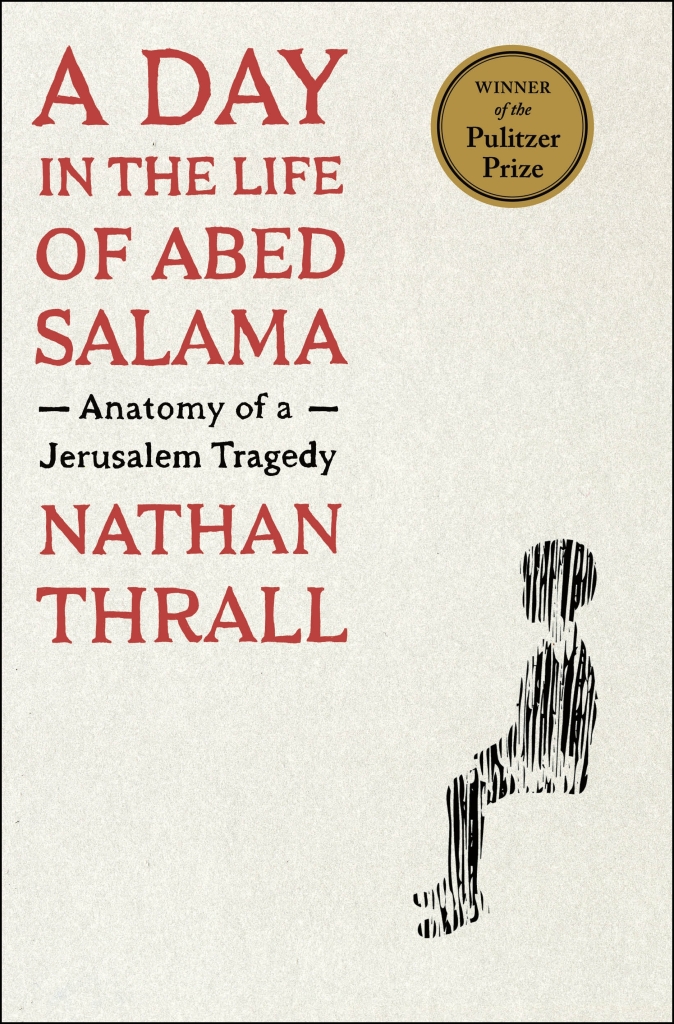
A Day in the Life of Abed Salama by Nathan Thrall
Audiobook narrated by Peter Ganim
Published: October 3, 2023 by Metropolitan Books
Buy this book at: Amazon / Barnes & Noble / AbeBooks
Synopsis:
Five-year-old Milad Salama is excited for a school trip to a theme park on the outskirts of Jerusalem. On the way, his bus collides with a semitrailer. His father, Abed, gets word of the crash and rushes to the site. The scene is chaos―the children have been taken to different hospitals in Jerusalem and the West Bank; some are missing, others cannot be identified. Abed sets off on an odyssey to learn Milad’s fate. It is every parent’s worst nightmare, but for Abed it is compounded by the maze of physical, emotional, and bureaucratic obstacles he must navigate because he is Palestinian. He is on the wrong side of the separation wall, holds the wrong ID to pass the military checkpoints, and has the wrong papers to enter the city of Jerusalem. Abed’s quest to find Milad is interwoven with the stories of a cast of Jewish and Palestinian characters whose lives and histories unexpectedly converge.
Rating: ![]()
Review:
This is another example of a book that tried to do too much, and as a consequence it loses the premise that was promised. I was told that this was a book about a man stuck in the Palestine/Israel conflict. I was told that this was a book about a man whose son disappears after a tragic accident and his journey to try and find his son. Unfortunately, the journey of Abed Salama and his son was only about 10% of this book. At only six hours runtime, it was a short book. And the actual synopsis was only a small part of it.
Quickly after being introduced to Abed and his family, we get a short history lesson in the history of the Palestine/Israel conflict. A lot of other reviewers have felt this was irrelevant but I didn’t mind too much. While the book is titled “a day in the life”, there is a nuance to what someone’s day includes. Your day is never just about a singular 24 hour period. Your family influences your day. Your job. Where you live. The country that you live in. And, in the case of Abed, the long battles between Palestine and Israel influence his day. A single day can sometimes be shaped by 50 years of history. I enjoyed that nuance. I also enjoyed that the author conveyed this point without actually saying that was their point. It’s always appreciated when an author treats me like I am intelligent enough to understand the subtext.
We also get a very long history of Abed and how he grew up. His first wife. His struggles to accommodate his culture and his family. There was a lot of valuable insight to be gained by being introduced to this character in the depth that was presented in this book.
Where it falls off the rails was when we start following other characters. Honestly, I can only barely tell you who these people were. Their narratives are abrupt and presented with little to no explanation. I could piece together that one individual seemed to be the ambulance worker that arrives at the scene of the accident, another seemed to be a politician of some kind, another seemed to be an aid worker. I had a hard time keeping these characters straight because we launch straight into their narrative with no introduction to who they are or how they are relevant to the story of Abed. For some reason we spent an inordinate amount of time talking about a refugee camp in Jordan and the return to Palestine of those individuals who had been living in the refugee camp. I was quickly confused and tuned out because I couldn’t follow what was going on.
We only come back to Abed’s search for his son at the very end of the book. I wanted to spend more time on that, because that’s the story that I was sold. But it wasn’t the story that I got. In total this was a good book, but it got lost in its own narrative and forgot to tell me the story that was promised.
Part of the reason for fiction is to live other lives, ones we don’t understand.
If the message is too preachy, too obvious, only those who are already in the choir are interested in singing it.
The key to creating empathy via fiction is for a reader to see a character from the inside, slowly, organically, with time for things to sink in, choices to be justified, consequences to be triggered. And for that, the STORY has to be irresistible.
I couldn’t continue The Kite Runner after the first chapter because I could already see where it was going, and, while sympathetic, I couldn’t become that small male child going straight to obvious tragedy. All the choices seemed made by the usual people in charge of the world. No change. No hope. Maybe I was wrong, and it went to a hopeful place, but the beginning didn’t make we want to live that journey and take such a huge chance that it wouldn’t.
Pretty sure I don’t want to read this one, either.
Well said. This book was a great concept but that ending just didn’t fit with the rest of the plot. Disappointing
‘The ending sell the next book.’ Oops!